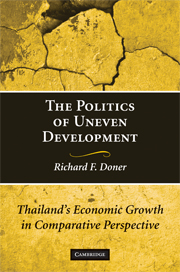Book contents
- Frontmatter
- Contents
- List of Tables and Figures
- Acknowledgments
- List of Abbreviations
- 1 The Challenge of Uneven Development
- 2 Puzzles of Thai Development in Comparative Perspective
- 3 Development Tasks, Institutions, and Politics
- 4 Origins and Consequences of Thailand's Intermediate State
- 5 Sugar
- 6 Textiles
- 7 Automobiles
- 8 Conclusion
- Appendix
- Bibliography
- Index
2 - Puzzles of Thai Development in Comparative Perspective
Published online by Cambridge University Press: 05 June 2012
- Frontmatter
- Contents
- List of Tables and Figures
- Acknowledgments
- List of Abbreviations
- 1 The Challenge of Uneven Development
- 2 Puzzles of Thai Development in Comparative Perspective
- 3 Development Tasks, Institutions, and Politics
- 4 Origins and Consequences of Thailand's Intermediate State
- 5 Sugar
- 6 Textiles
- 7 Automobiles
- 8 Conclusion
- Appendix
- Bibliography
- Index
Summary
Thailand poses two challenges to students of economic growth. One is to determine the degree and nature of the country's development: “Is Thailand a case of successful development or rather a case of maldevelopment?” My answer, presented in Section I, is that neither of these options is accurate. Thailand has experienced impressive but still uneven development, whose weaknesses threaten the sustainability of the economy's growth. The second and central challenge of this book is to understand the reasons for this mixed performance. Section II establishes the background for my answer by assessing several prominent, noninstitutional approaches: investment capital, human resources, entrepreneurship, policy, and political regime type. This empirically based assessment draws on Thai and other East Asian experiences and highlights the insufficiency of these explanations, while also noting their value. In the process, it demonstrates the importance of attention to the demand for and supply of institutional capacities.
THAILAND: THE “FIFTH TIGER”?
Achievements
Thailand has, by many criteria, been an economic superstar. Its position as one of the World Bank's High Performing Asian Economies reflects the country's consistent growth and structural change. GDP growth has averaged roughly 7.6% during the 1960s and 1970s, dropping to 5.55% during the debt crisis years of the early 1980s, and then rebounding to 9% during the boom years of 1985–1995 (Table 2.1).
- Type
- Chapter
- Information
- The Politics of Uneven DevelopmentThailand's Economic Growth in Comparative Perspective, pp. 25 - 63Publisher: Cambridge University PressPrint publication year: 2009



